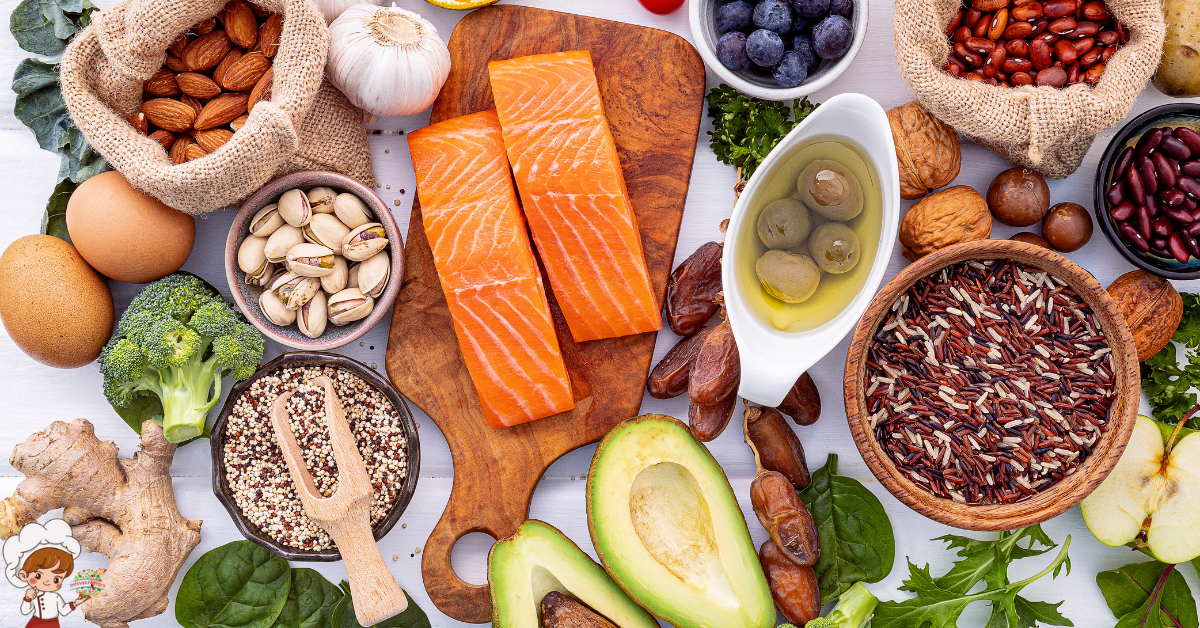Important Ketogenic Diet Principles for Seniors

Ketogenic Diet Principles for Seniors; Imagine embarking on a new dietary journey, like setting sail on uncharted waters. The world of nutrition can be overwhelming, especially when you’re a senior looking for the best approach to maintain your health and vitality. That’s where the ketogenic diet comes in. This discussion will guide you through the principles of the ketogenic diet specifically tailored for seniors, revealing the potential benefits, challenges, and practical tips to help you navigate this dietary path with confidence. Get ready to explore a world of delicious possibilities that could enhance your well-being and improve your quality of life.
Understanding the Ketogenic Diet
Understanding the ketogenic diet is essential for seniors who are considering adopting this low-carb, high-fat eating plan to improve their health and well-being. One key aspect to grasp is the concept of ketosis. Ketosis is a metabolic state in which the body primarily burns fat for fuel instead of carbohydrates. By drastically reducing carbohydrate intake and increasing fat consumption, the body enters ketosis and starts using ketones as an alternative energy source.
The ketogenic diet has gained attention for its potential benefits in managing diabetes. Research suggests that this eating plan may help improve blood sugar control and insulin sensitivity in individuals with type 2 diabetes. By limiting carbohydrate intake, the ketogenic diet minimizes the fluctuations in blood sugar levels and reduces the need for insulin. However, it is important for seniors with diabetes to consult with their healthcare provider before starting this diet, as it may require adjustments to their medication regimen.
Additionally, the ketogenic diet has been shown to promote weight loss, which can be beneficial for seniors who are overweight or obese. By reducing carbohydrate intake and increasing fat consumption, the body is forced to burn stored fat for energy. This can lead to significant weight loss over time. However, it is crucial for seniors to approach weight loss goals in a safe and sustainable manner, under the guidance of a healthcare professional.
Benefits of the Ketogenic Diet for Seniors
The ketogenic diet can offer several benefits for seniors. Firstly, it has been shown to improve cognitive function, helping to enhance memory and focus. Additionally, the diet can aid in weight management, which is especially important for seniors as maintaining a healthy weight can reduce the risk of various chronic conditions. By following a ketogenic diet, seniors can potentially experience these advantages and support their overall well-being.
Improved Cognitive Function
Improved cognitive function is one of the notable benefits that seniors can experience from following the ketogenic diet. Research suggests that the ketogenic diet may have a positive impact on cognitive health in several ways:
- Ketogenic diet and Alzheimer’s disease: Studies have shown that the ketogenic diet may help reduce the risk of Alzheimer’s disease. The diet’s high fat content and low carbohydrate intake can promote ketosis, a metabolic state where the brain uses ketones as an alternative fuel source. This can enhance brain function and protect against the neurodegenerative processes associated with Alzheimer’s disease.
- Ketogenic diet and memory improvement: The ketogenic diet has also been linked to improved memory and cognitive performance. By reducing inflammation and oxidative stress in the brain, the diet may enhance synaptic plasticity and support the formation of new memories.
- Other cognitive benefits: In addition to Alzheimer’s disease and memory improvement, the ketogenic diet has shown promise in improving other aspects of cognitive function, such as attention and focus.
Enhanced Weight Management
Seniors can benefit from the ketogenic diet as it promotes enhanced weight management. As individuals age, their metabolic health and appetite tend to change, making weight management a challenge. However, the ketogenic diet can help seniors overcome these obstacles. By reducing carbohydrate intake and increasing healthy fats, the body enters a state of ketosis, where it burns fat for fuel instead of glucose. This leads to weight loss and improved body composition. Additionally, the ketogenic diet has been shown to increase satiety and reduce hunger, making it easier for seniors to adhere to their dietary goals. By adopting a ketogenic lifestyle, seniors can achieve and maintain a healthy weight, improving their overall health and well-being.
Adjusting Macros for Senior Health
How can adjusting your macros contribute to better health as you age? As a senior, your nutritional needs may change, and it becomes crucial to adjust your macronutrient intake to support your overall health. Here are some key ways adjusting your macros can benefit you:
- Maintaining muscle mass: Consuming adequate protein is essential for seniors to maintain muscle mass and prevent muscle loss, which is a common issue with aging. Adjusting your macros to include a slightly higher protein intake can help preserve muscle and support strength and mobility.
- Promoting bone health: Adequate calcium and vitamin D intake is crucial for seniors to support bone health and prevent osteoporosis. Adjusting your macros to include more calcium-rich foods, such as dairy products and leafy greens, can be beneficial for maintaining strong bones.
- Enhancing cognitive function: Healthy fats, such as omega-3 fatty acids found in fatty fish and nuts, are essential for brain health and cognitive function. Adjusting your macros to include a moderate amount of healthy fats can support cognitive function and reduce the risk of cognitive decline.
When adjusting your macros for senior health, it is important to focus on nutrient-dense, senior-friendly keto recipes. These recipes should incorporate a balance of protein, healthy fats, and low glycemic index carbohydrates to provide essential nutrients while controlling blood sugar levels. Examples of senior-friendly keto recipes include grilled salmon with steamed vegetables, avocado and chicken salad, and cauliflower rice stir-fry with tofu.
Managing Potential Challenges of the Ketogenic Diet
To successfully manage the potential challenges of the ketogenic diet as a senior, it is important to focus on nutrition. Ensure that you are consuming a well-balanced diet that provides all the necessary nutrients and vitamins for your age group. Additionally, adapting to ketosis may take some time, so be patient and give your body the time it needs to adjust. Lastly, monitoring your health indicators, such as blood sugar levels and cholesterol, is crucial to ensure that the ketogenic diet is not negatively impacting your overall health.
Nutrition for Seniors
Managing the potential challenges of the ketogenic diet can be achieved through careful attention to nutrition for seniors. As seniors age, their nutritional needs may change, and it is important to ensure they are receiving a well-balanced diet while adhering to the principles of the ketogenic diet. Here are some tips to help seniors maintain a healthy eating plan while following the ketogenic diet:
- Focus on nutrient-dense foods: Prioritize foods that are rich in vitamins, minerals, and fiber, such as leafy greens, non-starchy vegetables, lean meats, and healthy fats.
- Adequate protein intake: Seniors should aim to consume enough protein to support muscle health and prevent muscle loss. This can be achieved through lean meats, poultry, fish, and plant-based protein sources.
- Meal preparation: Plan and prepare meals in advance to ensure seniors have access to keto-friendly options and avoid relying on convenience foods that may not align with their dietary needs.
Adapting to Ketosis
Adapting to ketosis on the ketogenic diet can be a challenging process initially, but with proper guidance and support, it is possible to overcome any potential obstacles. When transitioning to a ketogenic diet, your body needs time to adjust to using fat as its primary fuel source instead of carbohydrates. During this adaptation phase, you may experience some side effects known as the “keto flu.”
These include fatigue, headaches, dizziness, and irritability. However, these symptoms are temporary and can be managed by staying hydrated, increasing your electrolyte intake, and ensuring you’re consuming enough healthy fats. It’s also important to remember that everyone’s experience with adapting to ketosis may vary. If you have any concerns or experience severe side effects, it’s best to consult with a healthcare professional for personalized guidance.
Monitoring Health Indicators
As you embark on your ketogenic diet journey, it is important to monitor key health indicators to manage potential challenges effectively. Tracking your progress allows you to evaluate the impact of the diet on your overall health and make necessary adjustments. Consulting healthcare professionals throughout the process ensures that any potential health concerns are addressed promptly. Here are some important health indicators to monitor:
- Blood glucose levels: Regularly check your blood glucose levels to ensure they remain within a healthy range.
- Ketone levels: Measure ketone levels using urine strips or a blood ketone meter to ensure you are in a state of ketosis.
- Electrolyte balance: Monitor your electrolyte levels, especially sodium, potassium, and magnesium, as they can be affected by the diet.
Incorporating Nutrient-Dense Foods
To ensure optimal nutrition on a ketogenic diet, consider incorporating nutrient-dense foods into your meal plan. As a senior, meeting your nutrient requirements becomes even more crucial for maintaining good health. Nutrient-dense foods are rich in vitamins, minerals, and other essential nutrients, providing you with the necessary fuel to support your body’s functions. Here are some meal options to help you incorporate nutrient-dense foods into your ketogenic diet.
- Leafy Greens: Vegetables like spinach, kale, and Swiss chard are packed with vitamins A, C, and K, as well as minerals like magnesium and potassium. These greens can be enjoyed in salads or sautéed with healthy fats like olive oil.
- Berries: While fruits are generally limited on a ketogenic diet due to their higher carb content, berries such as strawberries, blueberries, and raspberries are lower in carbs and can be enjoyed in moderation. They are rich in antioxidants and fiber, providing a nutrient boost to your meals.
- Fatty Fish: Fish like salmon, mackerel, and sardines are excellent sources of omega-3 fatty acids, which have been shown to have numerous health benefits. These fish are also rich in protein, helping to support muscle health.
- Nuts and Seeds: Almonds, walnuts, chia seeds, and flaxseeds are all great options for incorporating healthy fats and fiber into your diet. They provide essential nutrients like vitamin E, magnesium, and omega-3 fatty acids.
- Avocado: Avocados are a staple of the ketogenic diet, as they are high in healthy fats and low in carbs. They are also a good source of fiber, potassium, and vitamins C and K.
Essential Supplements for Senior Ketogenic Dieters
Consider incorporating essential supplements into your ketogenic diet as a senior to support your overall health and well-being. While the ketogenic diet can provide many benefits, it’s important to ensure that you are getting all the necessary nutrients. Here are some supplement recommendations and dosage guidelines to consider:
- Electrolytes: When following a ketogenic diet, your body may excrete more electrolytes, such as sodium, potassium, and magnesium, due to the diuretic effect of ketosis. It is recommended to supplement with electrolytes to maintain proper balance and prevent imbalances that can lead to symptoms like muscle cramps, fatigue, and dizziness. Aim for 3-5 grams of sodium, 300-500 mg of magnesium, and 3,000-4,500 mg of potassium per day.
- Omega-3 Fatty Acids: Omega-3 fatty acids are important for brain health, heart health, and reducing inflammation. As seniors, it’s crucial to support cognitive function and cardiovascular health. Consider supplementing with fish oil or algae-based omega-3 supplements to ensure an adequate intake. Aim for 1,000-2,000 mg of EPA and DHA combined per day.
- Vitamin D: Many seniors are deficient in vitamin D due to reduced sun exposure and decreased ability to synthesize it in the skin. Vitamin D is crucial for bone health, immune function, and overall well-being. Consider supplementing with vitamin D3 to maintain optimal levels. The recommended daily dosage varies, but generally, 800-2,000 IU per day is recommended for seniors.
Meal Planning and Preparation Tips for Seniors
To effectively plan and prepare meals, seniors can incorporate these practical tips into their daily routine. When following a ketogenic diet, it is important to focus on senior-friendly recipes that are both nutritious and enjoyable. Here are some meal planning and preparation tips specifically tailored for seniors on a ketogenic diet.
Firstly, it is essential to plan your meals in advance. This will help you stay on track and ensure that you have the necessary ingredients on hand. Look for simple recipes that require minimal preparation and cooking time. Consider batch cooking and freezing meals in individual portions for easy access throughout the week.
When grocery shopping, make a list of the items you need and stick to it. Avoid aisles that contain processed snacks and sugary treats. Instead, focus on fresh produce, lean proteins, and healthy fats. Choose nutrient-dense foods that will provide you with the necessary vitamins and minerals.
To make meal preparation easier, invest in kitchen tools that can help save time and effort. For example, a slow cooker or an instant pot can be used to cook meals with minimal supervision. Pre-cut vegetables and pre-cooked meats can also be purchased to simplify the cooking process.
Additionally, consider seeking assistance from family members or friends when necessary. Meal preparation can be a social activity and involving loved ones can make the process more enjoyable. They can also help with tasks such as chopping vegetables or measuring ingredients.
Staying Active and Exercising on a Ketogenic Diet
Staying active and exercising is an integral part of a ketogenic diet for seniors. Regular physical activity not only helps with weight management but also promotes overall health and wellbeing. When following a ketogenic diet, it is essential to make exercise modifications to ensure you stay fit and maintain your energy levels. Here are some tips to help you stay active on a ketogenic diet:
- Choose low-impact exercises: Opt for activities that are easy on the joints, such as walking, swimming, or cycling. These exercises provide cardiovascular benefits while minimizing the risk of injury.
- Include strength training: Engaging in resistance exercises, such as lifting weights or using resistance bands, helps maintain muscle mass, which is especially important for seniors. It also aids in improving bone density and overall strength.
- Stay hydrated: Drinking enough water is crucial for maintaining proper hydration during exercise. Since the ketogenic diet can have a diuretic effect, it is important to drink plenty of fluids to prevent dehydration and maintain optimal performance.
Ketogenic Diet Principles for Seniors; Frequently Asked Questions
Can Seniors With Certain Health Conditions Follow the Ketogenic Diet?
Seniors with certain health conditions can follow the ketogenic diet, but there are risks and concerns. It’s important to consult with a healthcare professional to ensure it is safe and appropriate for you.
How Does the Ketogenic Diet Affect Medication Management for Seniors?
When following the ketogenic diet, it’s important to consider how it may affect your medication management. It’s recommended to consult with your healthcare provider to ensure that your medications are properly adjusted.
Are There Any Specific Concerns or Risks Associated With the Ketogenic Diet for Seniors?
There are specific concerns and risks associated with the ketogenic diet for seniors. It’s important to consider factors like nutrient deficiencies, increased risk of dehydration, and potential interactions with medications.
What Are Some Strategies for Overcoming Common Challenges While Following the Ketogenic Diet as a Senior?
To overcome common challenges while following the ketogenic diet as a senior, you can try meal planning, finding keto-friendly recipes, joining a support group, and reminding yourself of the health benefits to maintain motivation.
How Can Seniors Ensure They Are Meeting Their Nutritional Needs While on the Ketogenic Diet?
To meet your nutritional needs while on a ketogenic diet, ensure you’re maintaining a balanced diet. Focus on consuming a variety of nutrient-dense foods and consider supplementing with vitamins or minerals if necessary.
Conclusion
In conclusion, the ketogenic diet can be beneficial for seniors by promoting weight loss, improving cognitive function, and reducing inflammation. Adjusting macros and incorporating nutrient-dense foods are important for senior health. It is crucial for seniors to consult with a healthcare professional before starting any new diet, and to consider essential supplements for optimal health. Meal planning, staying active, and exercising regularly can further support the success of a ketogenic diet for seniors.








